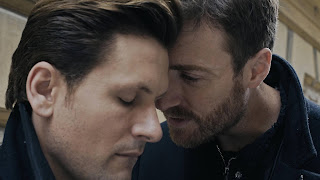Movie Review - Complete Strangers
A similar thing happens here, except instead of a young woman, it's a young gay man. Instead of a marriage, it's a red hot getaway, hopefully a weekend of passion. Instead of being about female insecurity, anxieties over social or financial status, it's about queer insecurity about what's more important or what's valued first in same-sex male relationships. There's a debate in gay culture and in this film if sex, specifically sexual intercourse, should be the first and most important, if not the only consideration in a gay male relationship. It's also about gay male identity and how linked it is to sexual expression, as well as how pornography is involved. This film could also be an exploration of how viewing pornography can blur one's vision of reality and fantasy, much like a kaleidoscope does, which is how Masó opens his film.
Masó himself stars as Robert, a young man of unknown origin, of unknown age and of unknown occupation. He's a veritable stranger. The only thing we know is that he lives in Budapest, Hungary, with his husband, Christian, played by Sindre Bergfall, in what looks like a very nice, if not fancy apartment. However, despite being a very handsome young man, Christian's origin is also unknown. His age is unknown and his occupation is unknown. It's not known how long the two have been together or why, but there is clearly some tension between them and some distance. It could be argued that these two are virtual strangers to each other, as much as they're strangers to those watching this film.Matthew Crawley (The Food That Built America and Super 8) co-stars as Hugo, an older man, older than Robert. Yet, he's another, veritable stranger. Nothing is known about him. It's more pronounced for him because he becomes involved with Robert and every time Robert asks Hugo questions to get to know him better, Hugo avoids answering. He aggressively avoids answering. He's also aggressive in how he lures Robert into his seduction. He's not the sweet charmer of Laurence Olivier in Rebecca or Cary Grant in Suspicion. He's more domineering and lecherous.
The question is why Robert would go along and basically submit to a man who is so aggressive that it could be mistaken for abusive. One could also argue that Hugo's behavior is just bravado or extreme passion. Depending on what Robert's history is, it could explain why he might not see Hugo's manipulations for the honey-trap that it might be. His friends, including Kate, played Sian Abrahams, and Frank, played by Fraser Fraser, warn him of potential danger, but Robert doesn't listen.Masó directs the film as a kind of character study. He makes good use of actual locations in Budapest, such as the Fisherman's Bastion and the Square of Heroes. The film even opens with a glorious wide-shot of the Budapest Parliament Building. It might come across as tourist-like, which probably isn't the case. Like a tourist though, we mostly sight-see without really learning too much. By the end though, a question is answered that makes both Robert and Hugo less like strangers, but everything isn't totally resolved.
There's also things to compare to Aleksandr's Price (2013), which was the second feature by Masó. His 2013 feature focused on an immigrant in the United States whose identity is subsumed by people who want him to be something that he doesn't want to be. The immigrant eventually surrenders to that identity. It's about how societal pressure can affect who a person is or becomes. A similar thing happens here where Robert's identity, which is mostly unknown, becomes what Hugo wants. It's less societal pressure here than it is pressure from this one lustful man. It's indicative of how people's lives or their personas can be shaped by others, often to survive or simply to please.Not Rated but contains sex, nudity and language.
Running Time: 1 hr. and 44 mins.
Available on VOD and digital platforms.














Nice❤️ in my list
ReplyDeleteVery nicely reviewed. But I am still confused about how it ended.
ReplyDeleteThis review praises the bold, outrageous, and unexpectedly heartfelt German film Wetlands for its raw depiction of female adolescence, combining shock humor with genuine emotion—making it a standout choice on www.fmoviesz.sc
ReplyDeleteCALL NOW
ReplyDelete